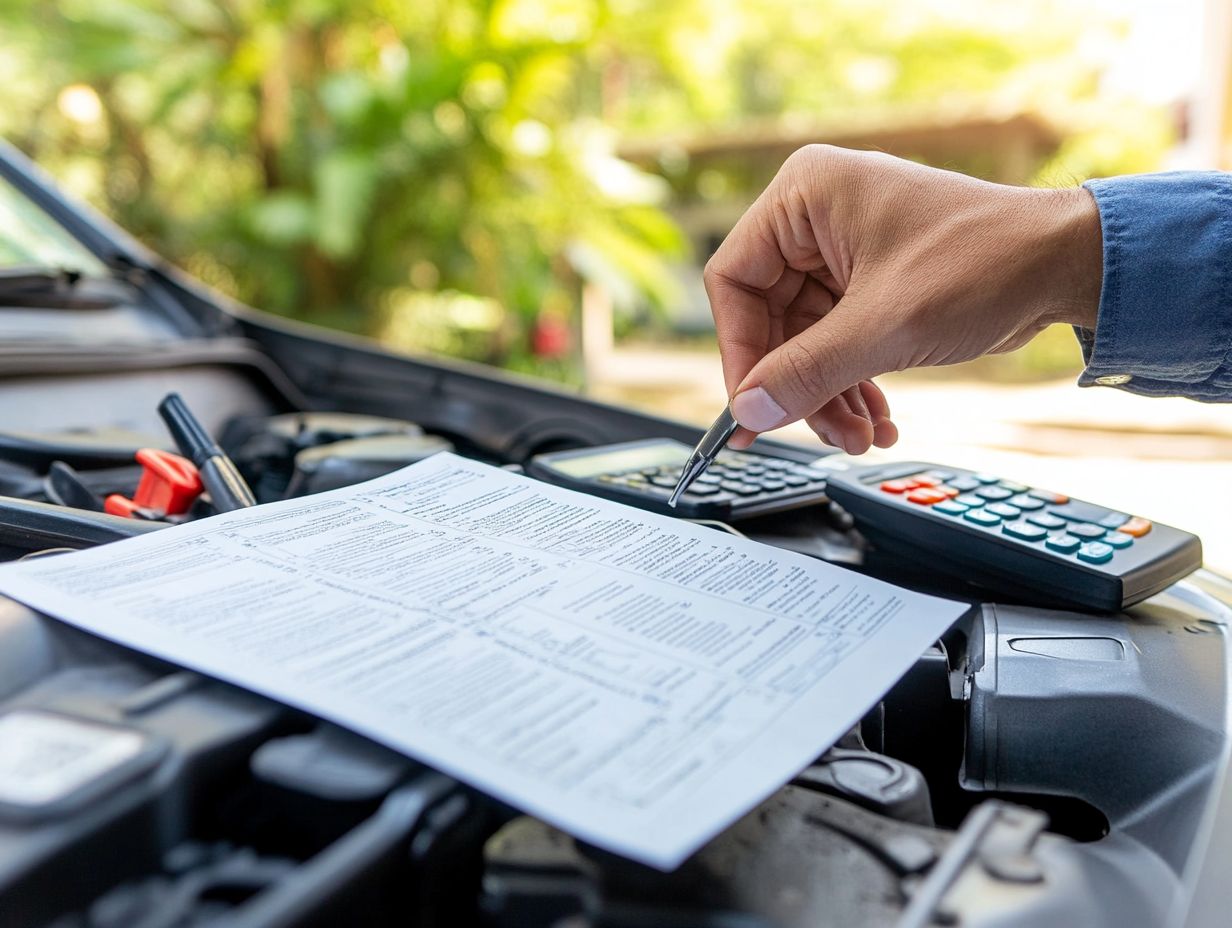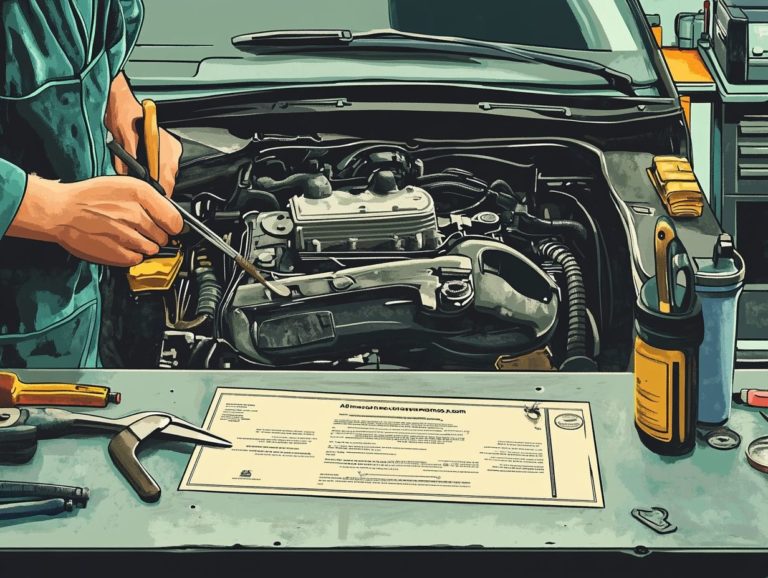5 Key Takeaways About Car Warranties
Ready to dive into the world of car warranties? Let s explore what you need to know! Navigating the intricate landscape of car warranties can indeed feel overwhelming, especially with the myriad of options and terms to decipher.
Whether you re contemplating the purchase of a new vehicle or seeking to safeguard your investment, understanding the nuances of car warranties is crucial.
This article will illuminate everything you need to know, from the various types available to what is genuinely covered. It will also dispel common misconceptions and provide valuable tips for maximizing your warranty benefits.
Prepare to uncover key insights that will empower your decision-making!
Contents
- Key Takeaways:
- 1. What Is a Car Warranty?
- 2. Types of Car Warranties
- 3. What Does a Car Warranty Cover?
- 4. Factors to Consider When Choosing a Car Warranty
- 5. Common Misconceptions About Car Warranties
- What Happens When a Car Warranty Expires?
- Frequently Asked Questions
- What are the five key takeaways about car warranties?
- What is the importance of understanding the coverage of a car warranty?
- Why is it important to know the length of a car warranty?
- What should I consider when looking at the cost of a car warranty?
- Is it beneficial to have a transferable car warranty?
- Are there any potential drawbacks to car warranties?
Key Takeaways:

- Car warranties protect you from unexpected vehicle repair costs.
- Various types of car warranties exist with different coverage levels.
- Consider your budget and car condition when choosing a warranty.
1. What Is a Car Warranty?
A car warranty is essentially your safety net, crafted to shield you from various repair costs and provide peace of mind. It covers expenses related to manufacturing defects and car problems, allowing you to drive without the nagging worry of unexpected expenses.
This peace of mind can truly change the game for you! Especially when an unexpected malfunction occurs and repair bills threaten to spiral out of control. You’ll find a variety of coverage options available, such as Endurance coverage, designed to cater to your specific needs and preferences. These plans can range from basic powertrain coverage to all-encompassing bumper-to-bumper protection, offering a wealth of benefits.
As a car owner, understanding the claims process is essential. A simple process can accelerate repairs and ease your mind. Typically, this involves notifying your warranty provider, submitting the necessary documentation, and collaborating with an authorized repair shop. This way, you can keep your vehicle in peak condition without the burden of money issues.
2. Types of Car Warranties
There are various types of car warranties available to you, including extended warranties, used car warranties, and vehicle service contracts, each tailored to meet different needs and preferences of car owners like yourself.
For example, an extended warranty typically kicks in after the manufacturer s warranty expires, giving you peace of mind if you plan to keep your vehicle for several years. Conversely, used car warranties are crafted specifically for pre-owned vehicles, providing protection that considers the car s condition and age.
Companies such as Endurance, CarShield, and Carchex offer a spectrum of options within these categories, each presenting unique coverage plans that can fit varying budgets and requirements. Understanding the distinctions between these warranty types can profoundly impact your experience as a car owner and enhance your financial security.
3. What Does a Car Warranty Cover?
A car warranty typically covers a wide array of issues, including repair costs linked to mechanical breakdowns and manufacturing defects, providing you with essential support to maintain your vehicle’s reliability and enhance your satisfaction as a customer.
This coverage often encompasses critical components such as the engine, transmission, and electrical systems, safeguarding you from unexpected and potentially costly repairs. More specifically, warranties address issues like faulty parts or subpar assembly that can lead to significant functional problems down the line.
With these protections in place, you can navigate the complexities of car maintenance with greater confidence, knowing you re shielded from financial burdens associated with repairs due to mechanical failures or manufacturer errors. Ultimately, this peace of mind gives you the power to focus on enjoying your driving experience without the constant worry of unforeseen expenses.
4. Factors to Consider When Choosing a Car Warranty

When you’re choosing a car warranty, it s crucial to weigh factors like deductible costs, available coverage options, and claims process efficiency. These will help you select the auto protection plan that suits you best.
Understanding the distinctions between various types of coverage can significantly enhance the overall value of your investment. For example, powertrain coverage refers to the engine and transmission, while bumper-to-bumper coverage encompasses almost everything in the vehicle, including most mechanical and electrical components.
Take the time to familiarize yourself with the specific vehicle maintenance requirements outlined in the warranty. Neglecting these obligations could put your claims at risk.
Knowing the claims process, including required documentation and filing deadlines, helps you make informed choices. This knowledge also paves the way for a smoother experience should unexpected repairs come your way.
Ultimately, making an informed decision can save you both time and money, while extending the longevity of your vehicle.
5. Common Misconceptions About Car Warranties
There are many misconceptions surrounding car warranties that can lead to confusion and dissatisfaction. For instance, you might think they are unnecessary or that all service contracts are created equal, but that’s far from the truth. To clear up any uncertainties, check out the top 10 questions about car warranties.
Understanding the difference between warranties and service contracts is essential for making informed decisions. Many people mistakenly believe that purchasing a service contract offers the same protections as a manufacturer’s warranty. In reality, these two serve distinct purposes.
The Federal Trade Commission (FTC) and the Magnuson-Moss Warranty Act emphasize that you have specific legal rights regarding warranties. These protections ensure that the services and materials provided for your vehicle are up to standard.
By being aware of these laws, you can enhance your satisfaction as a customer. They clarify the remedies available if a warranty issue arises, ultimately giving you a clearer picture of your rights and options as a driver.
What Happens When a Car Warranty Expires?
When your car warranty expires, you may find yourself facing unexpected repair costs without the safety net of a vehicle protection plan. Many drivers quickly realize they need an extended warranty for peace of mind.
Navigating this transitional phase can feel overwhelming. Unexpected repairs can arise, often bringing significant financial strain along with them. Without coverage, even minor issues can balloon into hefty expenses, leading you to carefully assess your options.
Choosing to opt for an extended warranty significantly eases these worries. It provides essential financial protection against the unpredictability of vehicle maintenance, assuring you that you won t have to shoulder the entire burden of repair costs alone.
This safety net becomes even more invaluable as your vehicle ages, ensuring that ongoing maintenance needs are met without throwing your personal budget off track.
Should You Purchase an Extended Warranty?
Purchasing an extended warranty can offer you substantial peace of mind. It alleviates the stress of unexpected repair costs while enhancing the reliability of your vehicle over time.
For many drivers, the unpredictability of automotive repairs can be a source of considerable anxiety. The financial strain of sudden mechanical failures often means scrambling for funds at the worst possible moment. An extended warranty acts as a protective shield against such worries, safeguarding you from hefty repair bills.
It’s crucial to evaluate the benefits alongside potential drawbacks. Consider upfront costs and any exclusions that may apply. A thorough understanding of the importance of reading your car warranty can dramatically enhance your satisfaction, instilling confidence in your vehicle’s performance.
Don t wait until repair bills start piling up consider getting an extended warranty today!
How Can You Make the Most of Your Car Warranty?

To maximize the benefits of your car warranty, it is essential to understand the claims process, keep accurate repair records, and follow regular vehicle maintenance guidelines.
Knowing the specific terms and conditions of your warranty helps you avoid common mistakes that can lead to denied claims. Organizing a folder of receipts and repair documentation will ensure a smoother experience when it’s time to file for coverage.
Following the manufacturer s recommended maintenance schedule not only extends your vehicle’s lifespan but also maintains warranty validity. Many warranties require proof of routine maintenance. These simple ways to protect your car create a solid approach to safeguarding your investment.
What Are the Most Common Issues Covered by Car Warranties?
Car warranties typically cover issues like mechanical breakdowns and manufacturing defects, significantly impacting your repair costs and overall vehicle reliability.
These warranties protect you against problems such as engine failures, transmission issues, and electrical system malfunctions. For example, if your vehicle has a blown head gasket or a faulty alternator, the warranty can ease the financial burden by covering the repair costs. This not only enhances your peace of mind but also builds trust in your vehicle s performance.
By providing comprehensive coverage, car warranties safeguard you from unforeseen costs, and 5 reasons to consider an extended warranty can further enhance your ownership experience, contributing to a more reliable and enjoyable ride.
What Are the Alternatives to Car Warranties?
There are several appealing alternatives to traditional car warranties, such as vehicle protection plans and maintenance plans. These options can cover repair costs and boost your overall satisfaction as a driver.
These alternatives offer flexibility and tailored features to meet your specific needs. For instance, vehicle protection plans may cover a broader range of repairs than standard warranties, giving you peace of mind during unexpected breakdowns. Maintenance plans can simplify your service visits and protect you from costly repairs, ensuring your vehicle remains in peak condition.
Exploring these alternatives can reveal effective solutions that alleviate financial stress and enhance your driving experience.
What Are the Benefits of Having a Car Warranty?
Having a car warranty offers a wealth of benefits, including peace of mind from unexpected repair costs, improved vehicle reliability, and enhanced customer satisfaction. To learn more, check out what to know about extended car warranties.
In a world where vehicle repairs can impose significant financial burdens, a warranty acts as your protective shield against daunting bills from unforeseen mechanical failures. With this safety net, you can stick to your budget and drive worry-free!
With a warranty in place, you can drive confidently, knowing you re shielded from many common issues that come with an aging car. This extra security fosters trust in your vehicle s reliability, allowing you to enjoy driving without stressing about potential expenses.
Frequently Asked Questions

What are the five key takeaways about car warranties?
The five key takeaways about car warranties are: understanding the coverage, knowing the length of the warranty, considering the cost, checking for transferability, and being aware of any deductibles or limitations.
What is the importance of understanding the coverage of a car warranty?
Understanding the coverage of a car warranty is crucial as it outlines what repairs and maintenance are included. This knowledge helps you determine if the warranty is comprehensive enough for your needs and if there are any potential gaps in coverage.
Act now to protect your investment!
Why is it important to know the length of a car warranty?
The length of a car warranty shows how long you are covered for repairs or issues. Knowing this helps you decide when to consider an extended warranty.
What should I consider when looking at the cost of a car warranty?
When evaluating a car warranty, think about its overall value and the reputation of the provider. Be aware of the red flags when choosing a warranty to ensure that the cost fits your budget and expected expenses.
Is it beneficial to have a transferable car warranty?
A transferable car warranty is beneficial. It allows you to pass the remaining coverage to a new owner, increasing your car’s resale value and providing peace of mind.
Are there any potential drawbacks to car warranties?
Car warranties offer coverage and peace of mind, but they may have limitations and deductibles. To avoid misconceptions, it’s important to be aware of the myths about used car warranties and always review the terms to understand any potential drawbacks.





